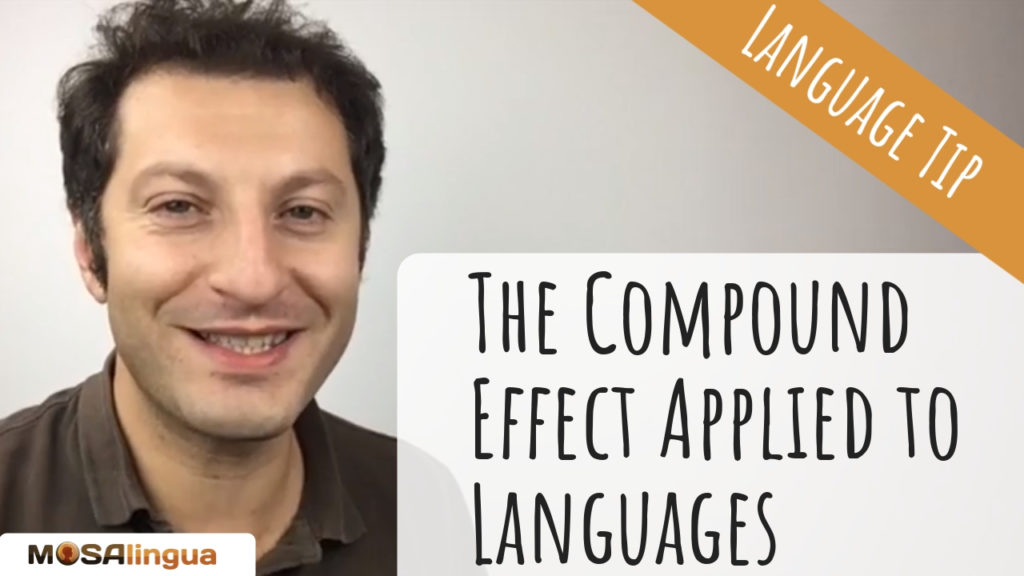Learning a language can seem like a huge task and so many people get discouraged when they think about the amount of time they need to invest to succeed. But today, I want to help you see things in a completely different way. Have you ever heard of the compound effect? In his famous bestseller Darren Hardy defines the compound effect as the principle of reaping huge rewards from a series of small, smart choices. In the book, the author comes up with a simple formula to explain how the compound effect works: “Small, Smart Choices + Consistency + Time = Radical Difference“.

The compound effect and what it means for language learners
We often say that ten minutes a day can be enough to learn a language. Everyone, no matter how busy she or he is, can find 10 minutes, right? The problem is that many people think that 10 minutes is too little time to make any difference. But, let’s see what happens when you study 10 minutes per day for 90 days. 10 minutes * 90 days = 900 minutes, which is 15 hours, but of course nobody is telling you to stop after three months.
Let’s see what happens if you continue: 10 minutes * 180 days = 1800 minutes, which is 30 hours of practice. So if you reach six months, this will double your practice time, and if you reach twelve months, this will result in 60 hours of study. Think about it, 10 minutes seems like it would make little impact, but, 15, 30, or 60 hours dedicated to language learning and practice can make a massive improvement in your skills. And, if you’re more motivated, you can study 20 minutes a day and double the compound effect. Take a look here. 20 minutes * 90 days = 1800 minutes, which corresponds to 30 hours, and so on…
Let’s go back to Darren Hardy’s formula. Do you remember it? “Small, smart choices + Consistency + Time = Radical Difference” For language learners, this becomes: “Choosing To Learn a Language For 10 Minutes Per Day”. Doing It Every Day + (for example) 90/180/360 Days = Radical Progress. It’s clear now that your decision to study for those apparently insignificant ten minutes a day 51 can result in many hours of practice and, consequently, in amazing progress. And the beauty of the compound effect is that it has the ability to produce exponential results.
What difference does it make?
If you’ve been studying for 3 months, and you notice that you’re improving, you will be motivated to continue. You’ll also probably invest even more time in your language practice. Of course, you need to be smart and make the best use of these hours. You might know from experience that in many countries the majority of students cannot speak a foreign language, even after many, many hours of classes. But, luckily for you, you’re watching this video. In the video’s description on YouTube we suggest some tools and methods to make the best use of this time.
In conclusion, I strongly recommend that you: 1st. Make the small choice to study a language for at least 10 minutes per day. 2nd. Be consistent and do it every day 3rd. Continue for a considerable amount of time, for example, 3, 6 or 12 months. And finally, (4th) Enjoy the results of the compound effect on your language skills. Now a final thought. People often talk about the compound effect to explain that if you regularly save money, in the long run, you will end up with a lot of savings. But if you think about it, it makes even more sense to invest in learning a language. Why? Because what you know and the skills you develop will always be with you. Unlike money, which as you probably know, is often spent way too easily!
Have a look around our channel if you’re interested in more videos like this one!
Related posts:
Start learning a new language today

Good news: we can help!
More good news: you can get started for free! Start your free trial now and for the next 15 days, take advantage of the most effective language learning method on the market!
Vocabulary flashcards, videos with subtitles, audiobooks, articles adapted to your level – with MosaLingua Premium (Web & Mobile), you’ll have access to all this and more. Get started right now. It’s free—and risk-free—to try!

![How to Improve Your Listening Skills [VIDEO]](https://www.mosalingua.com/en/files/2016/12/1-768x432-300x169.jpg)


Comments